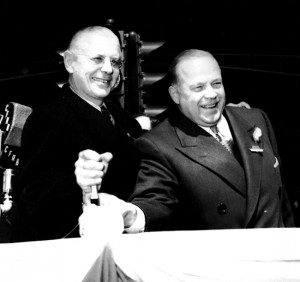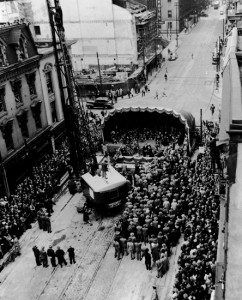
I guess because they demand the greatest attention on the world stage or occupy the most broadcast time and newspaper space, we tend to pay closest attention to national political figures when they speak.
When, for example, Sir Wilfrid Laurier said, “The 20th century belongs to Canada,” or Pierre Elliot Trudeau said, “Just watch me,” we remember the statement and the speaker. We don’t tend to remember, however, what Toronto Mayor Allan Lamport said about the way his city grew and prospered.
“No city ever became great,” he said, “without a subway.”
The occasion, as recorded by author and famous quotation collector John Robert Colombo, was the 40th anniversary of the building of the first leg of the Toronto Transit Commission subway on Yonge Street. It was just a few years before the three-time mayor of Toronto died at age 96 in 1999. Lamport was one of those rare municipal figures, who did great things, but also said some pretty strange things.
On his watch, for example, he helped open up a very straight-laced city by allowing young people to get out and skate or play ball on Sundays when the Lord’s Day Act had prohibited it for generations. On the other hand, he tried to keep girls out of his old private school, Upper Canada College, by claiming that early sexual contact between girl and boy students would lead to “degradation.” Then, there was his Yogi Berra-like comment about political opponents.
“If somebody’s going to stab me in the back,” he said, “I want to be there.”
Mayors in Canada perhaps say such outrageous things because otherwise they would never find themselves quoted in the press or on radio, TV or online at all. We just lost one of the most colourful former-mayors in the history of Canada. Ralph Klein, who later became premier of Alberta, in 1982, was mayor of Calgary. He never shied away from speaking his mind.
In particular, and quite famously at a meeting of the Calgary Newcomers’ Club, Mayor Klein lamented that 70 per cent of his city’s convenience-store thefts and 95 per cent of its bank robberies had been perpetrated by criminals outside Alberta; in particular, the mayor blamed Quebeckers.
“Eastern creeps and bums,” Klein called them. However, there’s one additional famous quote that apparently has been incorrectly credited to the former mayor. While most think the line, “Let the Eastern bastards freeze in the dark,” came from Mayor Klein’s mouth during the highly charged days of the National Energy Program, in fact, it was actually the creation of a clever bumper-sticker promoter. I’m sure, in the years since, former-mayor Klein never backed down from acknowledging that was how much he hated the NEP and it captured Calgarians’ feelings about decisions made in Ottawa rather pointedly.
And speaking of Ottawa, just down the street from Parliament Hill at Ottawa City Hall once resided one of the most flamboyant and outspoken mayors in the country’s municipal history. Charlotte Whitton was the first female mayor of a major city in Canada. She served as mayor of the national capital from 1951 to 1956 and again from 1960 to 1964.
In addition to wearing some of the most outrageous hats and outfits, however, Whitton stood out among politicians for what she believed in and the way she expressed those beliefs. While she was recognized as a social conservative (she did not support the idea of making divorce easier), she spoke out for women’s rights in law, business, labour, society and politics.
“Whatever women do, they must do twice as well as men to be thought of half as good,” she said and added, “luckily, this is not difficult.”

Oh, there are lots of other great one-liners from Canadian mayors. How about Montreal Mayor Jean Drapeau defending his city’s investment in the 1976 Olympic Games when he said, “The Montreal Olympics can no more have a deficit, than a man can have a baby.” It took the city 30 years to pay off the $1 billion debt.
Then, there was another Toronto mayor, Mel Lastman, who claimed, “Too many parents think all they have to do is give birth and walk away…” This, he said in 1979, just before it was revealed the children of his mistress had faced life below the poverty line. Then, there was Hazel McCallion’s perplexing question in Mississauga City Council back in 2007: “What happens if nothing happens?” she asked.
I pondered that one for a long time. But then I came back to the Toronto Mayor Allan Lamport. On the particular day in question, he might have been campaigning for the first subway line or what ultimately became the amalgamated municipality known as Metropolitan Toronto. But when he was challenged in council for mistaking amalgamation for growth, he let the opposition have with both barrels.
“Well, that’s a horse of a different garage,” he said.